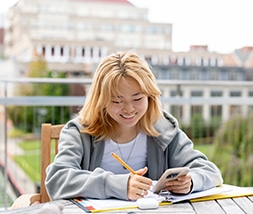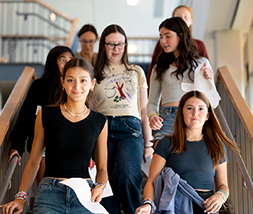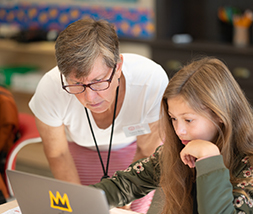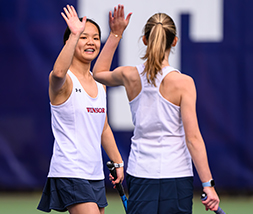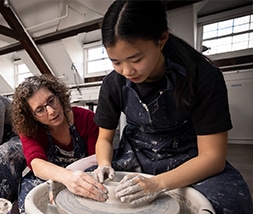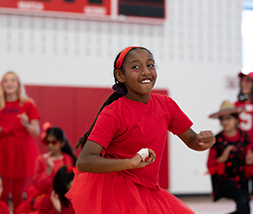Departments
Areas of Study
Winsor teachers share a passion for their individual disciplines as well as a vision of the school’s overarching educational mission. The departmental offices are typically abuzz with activity. Each teacher contributes their own specialized background—and unique personality—to the mix.
Winsor’s English Department offers a coordinated, rigorous, writing-intensive program that produces confident and skilled readers, writers, thinkers, and speakers. Winsor students benefit from small discussion-based classes, individualized instruction, grammar instruction, frequent writing opportunities with ample feedback from teachers, and engagement with a wide range of texts and voices. English courses provide one forum for engaging in important discussions about identity, power, equity, and inclusion, and we embrace the responsibility of facilitating these discussions with care, sensitivity, and courage.
The long-standing aim of Winsor’s History Department has been to create graduates equipped to pursue their aspirations and to contribute to the world as responsible and generous-minded citizens. In order to achieve this end, the department has emphasized these particular skills and dispositions in our curriculum and pedagogy.
- A general love for learning; an appreciation of the past and the historical antecedents of the present; a general aptitude in a variety of social science disciplines including political science, economics, and anthropology among others.
- The ability to think critically, to see multiple sides of an argument, to research effectively, and to identify bias and distortion in the media and other sources of information.
- The ability to express oneself clearly and persuasively in speech and in writing.
- The ability to see the world from another’s point of view and to participate in respectful intercultural dialogue and activity.
- The ability and willingness to act on behalf of social justice, equity, and human rights.
- The skills necessary to be a well-informed and active citizen both in the United States and in an increasingly interconnected and interdependent world.
The goal of the Winsor Department of World Languages is to help students develop the language and cultural skills necessary to engage with the world as informed global citizens. Beginning in Class I, Winsor offers students the possibility of up to an 8-year course of study in Mandarin Chinese, French, Latin, or Spanish. In the Upper School, students have the option to study two of these languages concurrently. The curricula of all four courses of study emphasize the importance of critical thinking skills related to language learning, such as deducing meaning from context and linguistic rules from language patterns, as well as the importance of communicative skills and cultural understanding. As students engage with texts, artwork, and cultural questions related to their target languages, they come away with an appreciation of their own cultural heritage and tools for engaging productively and respectfully with people from cultures different from their own.
The Mathematics Department prepares students to think logically and creatively about patterns, figures, numbers, functions, and applications and teaches skills necessary for success in an increasingly technical world. The department believes each student learns best and feels most successful and confident when she covers the material at an appropriately challenging pace.
The arts at Winsor present challenges that are intellectual, physical, and creative. The Performing and Visual Arts Departments together seek to offer a balanced program in studio art, drama, music, and dance. Students are encouraged but not required to fulfill their Upper School fine arts requirement with courses from more than one division.
Winsor’s Visual Arts Department strives to develop each student’s creative voice through a sequence of courses that provides exposure and skill development in a wide range of materials and processes, both traditional and technological, in the belief that artmaking is a form of expression that embodies diverse individual, cultural, and philosophical expression and has the power to effect change. Our mission is:
- To support students in reaching their creative potential through a rigorous and relevant college-preparatory education in the visual arts.
- To provide a creative curriculum that will engage every student enrolled in a visual arts course.
- To instill in our students a life-long passion for the visual arts that results in personal artistic pursuits beyond high school graduation.
- To provide students with intellectually focused and hands-on instruction in the practice of an array of visual arts media within the context of a Winsor education.
Physical Education is an integral part of the educational experience for every Winsor student. The program provides a setting in which young women can pursue excellence in the physical and emotional realms of their lives. By teaching lifelong skills, we strive to help students develop positive self-esteem and empower them to lead and maintain a healthy lifestyle.
The Science Department believes that girls naturally wonder about themselves, the physical world, and their place within it. We also recognize the under-representation of women in many fields of science. Therefore, a primary goal of our program is to encourage girls' enthusiasm for science while providing the skills and content necessary for scientific literacy, an understanding of the scientific process, and a solid preparation for those wishing to continue with post-secondary work in the sciences.
The objective of the Wellness Department is to provide accurate information and to practice skills that will help girls be self-reliant and responsible for their choices. Topics focus on building trusting relationships and community, conflict resolution, sexual development, wellness and the body, and chemicals and the mind. Student input is always relevant to course design as they keep us aware of addressing their particular needs and questions. Winsor’s commitment to pay equal attention to the intellectual, social, and moral development of students serves as the framework for these classes. Classes will include important facts and information, as well as time to grapple with quandaries of personal decision-making and ethics.
